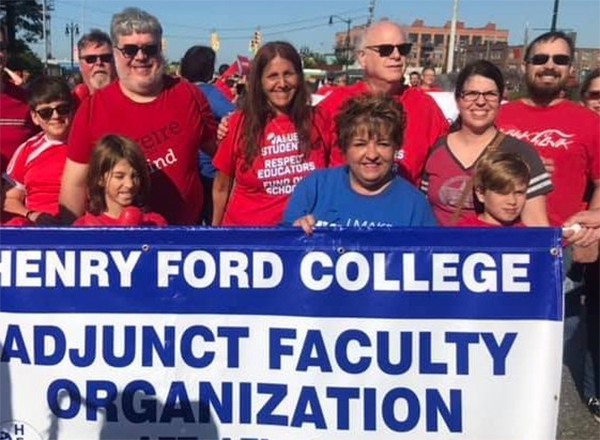Celebrating the contributions of Labor to the American workforce

Dear HFC Community,
This message is one of many related to our diverse community’s numerous unique holidays, including cultural, historic, and religious observances throughout the year. I am likely to write about the holidays or cultural observances that mean the most to you as they occur throughout the year. Please let me know if you want to learn my plans about a holiday that is specifically important to you.
On Monday, September 7, we celebrate the federal holiday of Labor Day. Most public offices, organizations, and schools, including Henry Ford College, encourage employees to honor and celebrate this day with a paid day away from work activities. We also suspend classes so that students may relax and celebrate.
What is Labor Day?
Labor Day is an American holiday that honors the labor movement in the United States. Many other nations celebrate a similar holiday, known as International Workers Day, on May 1.
The first U.S. Labor Day celebration, on September 5, 1882, was organized by the Central Labor Union as a holiday for workers in New York City. Ten thousand citizens in Manhattan took unpaid time off to march for labor rights that day.
Labor Day became a federal holiday in 1894, but the movement toward workers’ rights and safety was still decades away from achieving its goal of the protective statutes and regulations we see in today’s workplaces.
Last year, I wrote about the history of this holiday in detail. I encourage you to read it.
Labor Day is not officially a union holiday, but without organized labor, the holiday would not exist.
The labor movement is largely responsible for federal law that protects workers’ rights to collectively bargain with their employer. The National Labor Relations Act in 1935 helped lay the foundation for many of the workplace provisions we see today. Some of these include the 40-hour workweek, minimum wages and overtime pay, vacation and holiday pay, an end to child labor, job security provisions, employer-sponsored health care, anti-discrimination and anti-harassment laws, the Family and Medical Leave Act, pensions, and Social Security.
In today’s collective-bargaining landscape, Americans continue to debate the proper role of Unions. This open policy debate is a valued American political tradition.
Henry Ford College labor leadership
Henry Ford College has a proud history of successful labor unions. There are currently five unions on campus, whose membership includes the majority of Henry Ford College employees:
- HFCC-FT American Federation of Teachers Local 1650 (full-time faculty union), President John McDonald
- AFT LOCAL 337, AFL-CIO Adjunct Faculty Organization (part-time faculty union), President Lynn Boza
- American Federation of School Administrators, AFL-CIO Administrators’ Association, Local 71 (administrators’ union), President Joe Zitnik
- HFC-SSA Support Staff Association (support staff union), President Kimberly Kaier
- Dearborn Schools Operating Engineers Association (operating engineers’ union), President Tom Hand
I personally enjoy meeting regularly with these leaders individually. I also host a meeting each semester, in which I invite these union leaders to come together with me to listen and learn from each other.
Local 1650 and Local 337, and members of other unions, have a long tradition of participating in the annual Labor Day march in Detroit, which draws national leaders each year. Bill Clinton joined the march in 2016. This year’s march had to be canceled due to COVID, but during the summer, the planners were organizing virtual events to commemorate the holiday.
I value all HFC employees. These collective bargaining units represent our College’s employees, and I respect and value these unions and their leaders. I am proud to work with them, and I am proud of what they do for our College and in our community throughout the year.
Their service extends far beyond supporting their own members. They have been strong and consistent advocates for College millages, and for pro-education policy development at the state level. Their members generously volunteer their time for numerous community organizations. And they contribute significant financial support every year to non-profit organizations that serve our community.
This year in particular, our unions have been important partners with the College in addressing the many unexpected needs and impacts of the pandemic. We have worked together, and we have succeeded together. I am grateful for their commitment to the College and to our students.
Labor Day celebrations and observances
Traditionally, many cities and towns host fireworks displays, barbecues, and public arts or sports events during Labor Day weekend. The American football season, a popular sport at the high school, college, and professional levels, begins near Labor Day.
This year, most of these events have been canceled due to the pandemic. Many families will still take the three-day Labor Day weekend as the last chance to take summer trips, especially those who will head “up north” to favorite destinations for the weekend. Unofficially, Labor Day marks the end of the summer season.
To me, “Labor” is a cornerstone of the American way of life. It symbolizes our shared value that hard work can lead to individual and collective prosperity. Our own College values this idea, by helping our students and alumni build better futures. Whatever your plans for this Labor Day weekend, I hope you find it a relaxing and enjoyable experience. Please celebrate safely!
Russ Kavalhuna
President
president@hfcc.edu